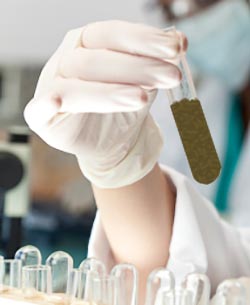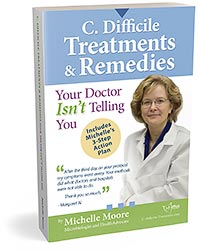 Most people who have had a fecal transplant that I hear from say they experienced good results, at least in the short term. Fecal microbiota transplantation (FMT) has always been controversial for a number of reasons, including unknown long-term effectiveness and the procedure’s repulsive perception by patients.
Most people who have had a fecal transplant that I hear from say they experienced good results, at least in the short term. Fecal microbiota transplantation (FMT) has always been controversial for a number of reasons, including unknown long-term effectiveness and the procedure’s repulsive perception by patients.
But as a microbiologist, one of my biggest concerns had always been that dangerous infections might spread from the donor to the patient through the donor’s stool. Apparently that fear was well founded, according to a recent warning from the FDA.
FDA Issues Warning on FMT
On June 13, 2019 the FDA issued a warning1 after a patient died from an infection that they contracted from an FMT. A second person who received an FMT from the same donor also got infected but survived.
Afterward, the donor’s stool was tested and found to contain a dangerous form of antibiotic-resistant E. coli bacteria. The donor’s stool was not tested for E. coli prior to performing the fecal transplants. During the FMT, the E. coli bacteria were unknowingly passed from the donor to both recipients.
New Requirements for Getting an FMT
In 2017 FMT officially became one of the recommended standard treatments for recurring C. diff. Now the FDA is listing new requirements2 for all future FMT procedures performed in the United States. All donor stool must now be tested for antibiotic resistant “superbugs” before it can be used for FMT.
Another new requirement is that donors with a high risk of having drug resistant bacteria in their bodies must be rejected, including health care workers, people in long term care facilities and people who engaged in medical tourism.
In addition, patients must be informed of the risk of antibiotic resistant infections that can be contracted from an FMT before consenting to the procedure.
FMT Still Has Health Risks
The FDA’s new FMT requirements make a lot of sense, especially the extra testing of stool samples. But the new testing requirements will not catch every kind of infection risk that may be found in stool. FMT donor stool may also contain toxins and non-infecting flora species that don’t show up in standard tests and could negatively affect your health.
The colon acts like a trash can for toxins dumped from the blood and liver. A 2013 study3 suggests that temporary fevers and elevated CRP indicative of inflammation show that toxins can be passed from a fecal matter donor to a transplant recipient.
Scientists still know very little about the secrets of the human gut microbiome and all the bacteria, viruses, fungi and yeast that live there. However, we have learned that the health of the microbiome is tied to many different health conditions including obesity, type 2 diabetes, IBS, IBD and depression4. So be aware that FMT donor stool may contain microorganisms that can affect your health through your microbiome, even if they don’t cause an infection.
Screening potential donors for chronic health challenges likely related to their microbiome health would be helpful, but such screening is not required by the FDA.
Should You Have a FMT?
Fecal transplants are often very effective against C. difficile as shown in multiple clinical studies. But there are obvious risks, including dangerous and deadly infections, unknown toxins and unforeseen long term health challenges. Whether or not the benefits of FMT outweigh the risks should be decided on an individual basis, with the guidance of a doctor who is knowledgeable about C. difficile.
Some people choose more natural and less invasive therapies before resorting to an FMT. A powerful combination includes broad-spectrum antibacterial remedies, toxin-binders and probiotics to target C. difficile on multiple fronts. I outline such a combination strategy in my 3-Step Action plan inside my book C. difficile Treatments and Remedies.
If you choose to have an FMT, then it’s important to understand all the risks and the limitations of the procedure. And for best long-term results, other steps need be taken besides having an FMT, including probiotics, immune support, proper diet and good hygiene and prevention practices.

About the Author – Michelle Moore, BSc
Michelle Moore is a microbiologist, holistic health educator, and author of C. difficile Treatments & Remedies. With over 10 years of experience in pharmaceutical research and over 20 years in natural medicine, she helps people overcome C. difficile and other chronic infections naturally.
References
- Important Safety Alert Regarding Use of Fecal Microbiota for Transplantation and Risk of Serious Adverse Reactions Due to Transmission of Multi-Drug Resistant Organisms (https://www.fda.gov/vaccines-blood-biologics/safety-availability-biologics/important-safety-alert-regarding-use-fecal-microbiota-transplantation-and-risk-serious-adverse)
- Information Pertaining to Additional Safety Protections Regarding Use of Fecal Microbiota for Transplantation – Screening and Testing of Stool Donors for Multi-drug Resistant Organisms (https://www.fda.gov/vaccines-blood-biologics/safety-availability-biologics/information-pertaining-additional-safety-protections-regarding-use-fecal-microbiota-transplantation)
- Temporal Bacterial Community Dynamics Vary Among Ulcerative Colitis Patients After Fecal Microbiota Transplantation. The American J of Gastroenterology (2013) 108, 1620–1630.
- Part 1: The Human Gut Microbiome in Health and Disease. Integrative Medicine (Encinitas). 2014 Dec; 13(6): 17–22.


 Fill in the form below to get our C. diff. tips newsletter and your free report “10 Things You Need to Know to Overcome C. difficile”.
We value your Privacy. Your email will be kept strictly confidential & secured. See our
Fill in the form below to get our C. diff. tips newsletter and your free report “10 Things You Need to Know to Overcome C. difficile”.
We value your Privacy. Your email will be kept strictly confidential & secured. See our 
